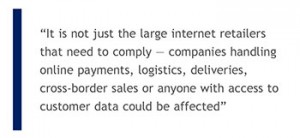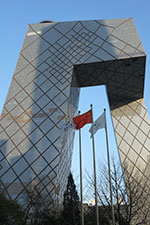Email: ai-leen.lim@awapatent.com
Website: www.awapatent.com
By Ai-Leen Lim, chief executive and principal counsel, AWA Asia (part of the Awapatent group)

Ai-Leen Lim
The past 12 months have brought several significant developments in the IP and online environment in China, many of which are game-changers in the way IP portfolios are managed and business is conducted online and offline.
Trademark owners, patentees, advertisers, platform operators, webstore owners, online key opinion leaders and celebrity endorsers are affected. It is no wonder that the international business community is watching these developments unfold with bated breath, while figuring out their compliance and risk-mitigation strategies, and also positioning themselves to reap the potential benefits from the changes.
China’s 13th five-year plan, which commentators see as the economic blueprint of what it aspires to achieve within the five-year period between 2016 and 2020, had foreshadowed this chain of legislative and administrative pronouncements. Its focus on economic growth through innovation, boosting of local consumption and the internet economy as an engine of growth have no doubt brought about this flurry of legislative and administrative rulings.
This article provides an overview of the important changes (and impending changes) to the legal landscape that reveals China’s recent active and swift intervention in regulating its internet economy and cyberspace, while it seeks to update the requisite regulatory infrastructure aimed at supporting an innovative society through strengthened IP protection and enforcement.
Cyber security
China’s Cyber Security Law was enacted on June 7, 2016 and will take effect from June 1, 2017.
Under this new law, data collected in China is required to be stored in China unless it is necessary to save this data offshore, but this needs to go through a security approval processes, the implementation details of which are still not announced. Network operators are obliged to provide technical support and assistance in criminal investigations and those relating to national security, and to save weblogs for not less than six months. The law also regulates the technology that is used in China’s internet space, through the requirement of prior certification of critical network equipment and specialised security products. This could result in very local technical standards being erected thereby creating a barrier in achieving global interoperability of IT systems. Also, critical information infrastructure systems are subject to national security reviews.
This new piece of legislation has been the subject of much speculation and uncertainty, which is not helped by its imprecise language. These provisions clearly present a challenge to one’s proprietary information and trade secrets, and also raise question marks over whether these measures are protectionist in nature to help safeguard the interests of Chinese businesses and offer them an advantage over foreign entities operating in China.
Finally, the new law echoes China’s online publishing regulations in extending the authorities’ long arm of reach in governing Chinese online matter, which disallows the publication of content that pose threats to the reputation or interests of the state, on the basis of the protection of national security interests through such control. These terms are broad and undefined, which allows for much room for interpretation by the authorities.
Patent examination
The State Intellectual Property Office (SIPO) issued its Revisions to the Patent Examination Guidelines on March 1, 2017, which take effect on April 1, 2017.
The amended guidelines are generally pro-patentee and are much welcomed by the IP community, although it is not clear how these will apply to pending applications and granted cases.
The amended guidelines have confirmed the current practice that business method patents are allowed if there is a technical element to the novel business method. Such inventions were previously rejected if the examiner could not find any claim more than rules and methods for mental activity, with no inventive technical effect.
Similarly, the amended guidelines have relaxed the examination criteria for software patents, through the introduction of two additional types of claims that applicants can consider, namely medium combined with computer programs, and apparatus claims that cover both hardware and computer program elements. Notwithstanding the above, the amended guidelines confirm that software per se is not patentable subject matter as they are in the nature of rules and methods for mental activities.
The amended guidelines also allow the patentee in an invalidation action to add to a claim one or more elements from other granted claims. In such cases, the party initiating the invalidation may apply to add new grounds in support of the invalidation in relation to the amended claims, but without the right to adduce new evidence.
E-commerce
China’s draft E-Commerce Law was published in December 2016 to solicit public opinions.
The draft law applies to e-commerce activities occurring within China or activities involving the participation of e-commerce operators or customers within China. If this draft law is passed, the affected companies will be required to ensure that they comply with the following personal data protection provisions:
- Notifying customers from whom they are collecting personal data that they are doing so, including how this data will be used, and also allowing customers to correct errors in their data so collected.
- Maintaining records for at least three years.
- Establishing internal control systems to securely manage data.
- Having a contingency plan should a data breach occur.
So it is not just the large internet retailers like Tao Bao/Tmall and JD.com and that need to comply. Companies handling online payments, logistics, deliveries, cross-border sales or anyone with access to customer data could be affected.
The draft law deals with the requirements for electronic contracts and lists prohibited activities that constitute unfair competition or manipulation of credit rating. Further, it contains consumer protection requirements concerning the authenticity of information, the quality control of goods and services, and security deposits. The draft law also contains provisions on IP protection and procedures for addressing complaints of IP infringement. Under the draft law, breaches result in serious consequences such as Rmb500,000 in fines and the suspension of the company’s business licence.
Trade mark examination and adjudication
 Updates on the Chinese Trademark Examination and Adjudication Criteria were issued by SAIC on January 4, 2017.
Updates on the Chinese Trademark Examination and Adjudication Criteria were issued by SAIC on January 4, 2017.
The criteria confirm and reaffirm the practices before the Chinese Trade Mark Office and the Trademark Review and Adjudication Board, which trade mark practitioners had observed even before January 2017. The key revisions to the criteria seek to strengthen the protection of prior right holders and to curb bad faith registrations and fraudulent trade mark squatting.
For instance, the criteria clarifies what constitutes “prior use” in the context of registrations (in bad faith) by third parties that had contractual or other business relationships with the mark owners — this means that the goods bearing the mark in question have been sold or promoted in China or even in cases where preparatory activities have been undertaken to launch the products in China. There is no need to prove a high degree of fame in this case. Nor is there a need to show that the mark is well known, as long as it can be proven that the third party falls within the numerous defined categories of contractual or business relationships.
Also, “interested parties” who are entitled to file oppositions and invalidations under Articles 33 and 45 respectively of the Trade Mark Law include licensees, successors in title, pledgees of the relevant prior rights. Further, even if a person did not have any interest at the time of the application, as long as he is vested with an interest at the time of adjudication, he shall be treated as an “interested party”.
Unfair competition
The latest version of the Draft Amendment to modernise and overhaul the 1993 Anti-Unfair Competition Law was issued for public consultation in February 2017.
The draft amendment expands the scope of unfair competition to cover commercial bribery, false or misleading marketing practices, theft of commercial secrets by employees or ex-employees, using technological tactics to force target jumping such as inserting a link without consent in web pages that are offering goods or services by other business operators, fraudulent prize awards, etc. Further, it protects against the unauthorised use of others’ names, trade marks (including unregistered well-known trade marks), domain names or web page content. It also contains provisions against products or services that are deliberately designed not to be compatible with other products. Breaches of the provisions could in serious cases result in fines of up to Rmb3 million or the revocation of business licences. Violations could also be recorded in a credit tracking system.
Internet advertising
The provisions of the amended Advertising Law were clarified in September 2016 by SAIC’s Interim Measures for the Administration of Internet Advertising to cover online advertising.
The measures have made it clear that the latest amendments to the Advertising Law extend to internet advertising, which is defined to cover product promotion via text, pictures, videos and links, email advertising, paid search advertisements and advertisements within commercial presentations. The groups that are most affected by these measures are internet advertisers and platform operators, but key opinion leaders and celebrities who endorse products online also need to comply with these regulations.
Any digital content placed on any online platform intended for the promotion of a product or service will be governed by the measures, which identifies individuals or groups who are online “publishers”, and these include any entity that displays or submits internet advertisements or that verifies or moderates submitted advertisements for publishing, who are all caught by the regulations. Hence content creators, platform operators (including search engines or content-sharing platforms that host third-party advertisements) are all affected.
Under the amended Advertising Law, terms such as the words “national”, “highest”, “best” or similar superlative claims are not allowed in advertising matter addressing Chinese consumers.
The measures also reiterate that online advertisements are prohibited for prescription drugs and tobacco products. Also, online advertisements on the products below require review before being published online:
- Medical treatments
- Pharmaceuticals
- Foods for special medical purposes
- Medical devices
- Pesticides
- Veterinary drugs
- Dietary supplements
Final reflections
It has been an eventful past 12 months for those who have been tracking the changes to the IP and internet landscape in China. These developments are certainly keeping in-house IP, legal and compliance teams busy as they review their IP and IT policies for China in light of these changes.
With the vast potential afforded by the Chinese market, businesses are acknowledging that it is a worthwhile exercise, which they also see as an opportunity to reconsider and refresh their business strategy for China given its continued importance as a key market for the world’s business community and as a manufacturing location. The role of e-commerce (and the convergence of social networking and e-commerce) as a driving force in the Chinese online space is also not to be ignored. Companies today are more than ever before alert to this reality and taking all necessary steps to take advantage of these changes while mitigating the minefields that come with these new regulations.
Key changes to watch
|

















